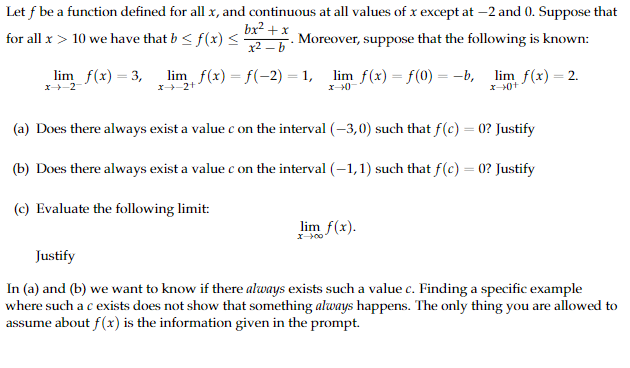Let f be a function defined for all x, and continuous at all values of x except at -2 and 0. bx² + x x²-b Moreover, suppose that the following is for all x > 10 we have that b ≤ f(x) ≤. lim_f(x) = 3, x 2 lim f(x) = f(-2) = 1, lim f(x) = f(0) = -b, x 2+ x-0 lim f(- lim f(x). x->0+ (a) Does there always exist a value c on the interval (-3,0) such that f(c) = 0? Justify (b) Does there always exist a value c on the interval (-1,1) such that f(c) = 0? Justify (c) Evaluate the following limit:
Let f be a function defined for all x, and continuous at all values of x except at -2 and 0. bx² + x x²-b Moreover, suppose that the following is for all x > 10 we have that b ≤ f(x) ≤. lim_f(x) = 3, x 2 lim f(x) = f(-2) = 1, lim f(x) = f(0) = -b, x 2+ x-0 lim f(- lim f(x). x->0+ (a) Does there always exist a value c on the interval (-3,0) such that f(c) = 0? Justify (b) Does there always exist a value c on the interval (-1,1) such that f(c) = 0? Justify (c) Evaluate the following limit:
Chapter3: Functions
Section3.3: Rates Of Change And Behavior Of Graphs
Problem 2SE: If a functionfis increasing on (a,b) and decreasing on (b,c) , then what can be said about the local...
Related questions
Question
100%

Transcribed Image Text:Let f be a function defined for all x, and continuous at all values of x except at -2 and 0. Suppose that
bx² + x
for all x > 10 we have that b ≤ f(x) ≤2. Moreover, suppose that the following is known:
lim_f(x) = 3,
x 2
lim f(x) = f(-2) = 1, lim f(x) = f(0) = -b,
x 2+
x-0
lim_ f(x) = 2.
x-0+
(a) Does there always exist a value c on the interval (-3,0) such that f(c) = 0? Justify
(b) Does there always exist a value c on the interval (-1,1) such that f(c) = 0? Justify
(c) Evaluate the following limit:
lim f(x).
Justify
In (a) and (b) we want to know if there always exists such a value c. Finding a specific example
where such a c exists does not show that something always happens. The only thing you are allowed to
assume about f(x) is the information given in the prompt.
Expert Solution
This question has been solved!
Explore an expertly crafted, step-by-step solution for a thorough understanding of key concepts.
This is a popular solution!
Trending now
This is a popular solution!
Step by step
Solved in 3 steps with 3 images

Recommended textbooks for you


College Algebra (MindTap Course List)
Algebra
ISBN:
9781305652231
Author:
R. David Gustafson, Jeff Hughes
Publisher:
Cengage Learning


College Algebra (MindTap Course List)
Algebra
ISBN:
9781305652231
Author:
R. David Gustafson, Jeff Hughes
Publisher:
Cengage Learning